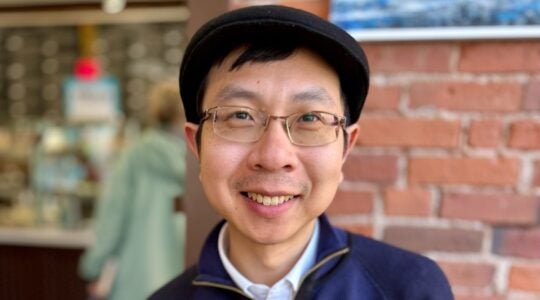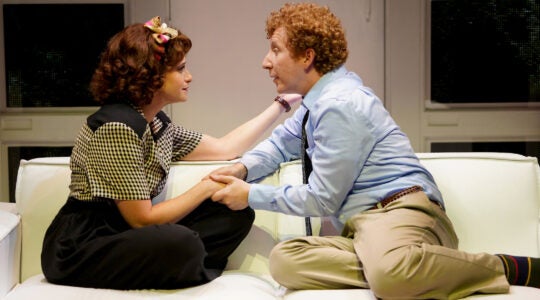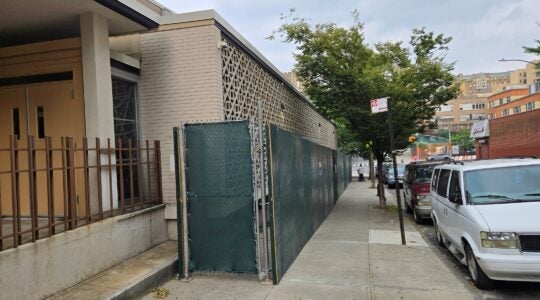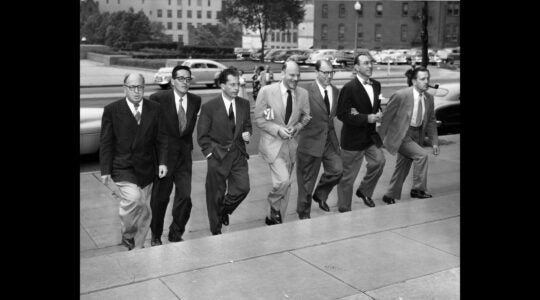From being thrown in the Nile, to Roman flames, to Kishinev nights to Babi Yar, Jews learn early and often that only the lucky die in bed. On the last Shabbat of October, Robert Bowers, who stands charged with murdering 11 Jews in Pittsburgh’s Squirrel Hill, sprayed them with bullets in their synagogue, in prayer. In New York, the spiritual and emotional repercussions ricocheted through Chabad’s annual gathering of 4,785 shluchim (emissaries of the last two Lubavitcher rebbes), from 101 countries, and nearly a thousand more supporters who flew in from around the world.
Rabbi Moshe Kotlarsky, chair of the banquet, reminded the shluchim that Chabad was all too acquainted with darkness: In November, 10 years ago, two of the Rebbe’s emissaries, Rabbi Gavriel and Rivky Holzberg, “were brutally murdered,” along with six others, by Islamic terrorists in the Chabad House of Mumbai, India.
It takes more than killers to rattle Chabad. A young couple, Rabbi Yisroel and Chaya Kozlovsky, almost immediately went out as emissaries of the Rebbe, Rabbi Menachem Mendel Schneerson (3,661 Chabad families have gone out as emissaries since the Rebbe died in 1994, three times as many as while he was alive, but the Kozlovskys, like all the post-1994 shluchim, consider themselves emissaries of the Rebbe, nevertheless). The Kozlovskys moved into the very same Chabad House where the eight were murdered. Through the “continuity in the work of the Chabad House in Mumbai,” said Rabbi Kotlarsky, “may we find true solace.”
Solace was more elusive in Pittsburgh. It was still the shiva week, still too raw. Melvin Wax, 88, one of the 11 murdered, had been one of the first students of Chabad’s Pittsburgh yeshiva that opened in 1943, shortly after shluchim were sent to the city by the previous Lubavitcher Rebbe. It is now the oldest day school in Pittsburgh and a multiple winner of the U.S. Department of Education’s Blue Ribbon award.
Nine shluchim to Pittsburgh were absent from the first days of the Kinus (as the shluchim gathering is officially known) because they felt they couldn’t leave their responsibilities back home. They joined their “brothers” on Sunday morning, in time to read a Psalm, as well as leading all 4,785 shluchim in the singing of Ani Ma’amin, the hymn based on Maimonides’ “Principles of Faith,” affirming belief “in the coming of the Messiah, and though he may delay, every day I anticipate his coming.” All the shluchim knew the words.
At the banquet, held in a vast hall at Rockland Community College in Suffern, N.Y., Rabbi Yossi Brackman, director of the Chabad of University of Chicago and Hyde Park, told us that at a vigil there, “My wife, Baila, sees a young woman bawling her eyes out. My wife asks if she was OK. The student answers, ‘I don’t think I belong here.’ My wife says, ‘You’re Jewish, of course, you belong here.’ The student replies, ‘But I was raised with nothing, with no Jewish identity,’” no background. As the Rebbe used to remind shluchim, every Jew has a Jewish identity, a Jewish background: Abraham and Sarah, that’s background enough. Although Israel’s Chief Rabbi David Lau preferred not to call Pittsburgh’s non-Orthodox place of death a synagogue, a letter from Chabad shluchim to their local communities declared, “eleven children of Sarah lost their lives because they were Jews and they were in shul.”
Baila and the young woman agreed to meet for coffee, perhaps a Shabbat meal. “I hope it’s the beginning of a relationship,” said Rabbi Brackman. He was in Brooklyn for Shabbos “but I heard that many people came [to our shul], a lot of students that don’t show up regularly, people we haven’t seen before.”
Chabad started a program in Pittsburgh to distribute 1,100 mezuzahs, 100 for each of the martyrs. The mezuzah campaign was going national, said Rabbi Brackman. He knew of many students putting up mezuzahs in their dorms. There’s a strong sense of Jewish pride.” He pointed out that a mezuzah publicly marks the home as Jewish, and therefore is an act of pride. Rabbi Brackman recalled the rebbe’s advice, in times of darkness, “add light.” Students from Melvin Wax’s old school were handing out Shabbos candles, or chalking pictures of candles on the sidewalk alongside candle-lighting times, or offering Jews at vigils the opportunity to put on tefillin. Other students baked challahs to distribute, or brought coffee and donuts to the police.
In Russia, Rabbi Levi Mondshine, a shaliach to Smolensk, a city on the Dnieper River, 220 miles southwest of Moscow, told us that his wife, Chana, grew up in Pittsburgh, and the news of the murders naturally stirred memories and compassion for the world she left behind. The Mondshines, even in the vast isolation of Russia, had seen the black poster, “Stronger Than Hate,” featuring the Pittsburgh Steelers logo of three star-like hypocycloid shapes, with a Jewish Star replacing the uppermost yellow one. Rabbi Mondshine and other Smolensk Jews now had the image of that poster on their phones, if not on their walls. The Pittsburgh poster is now in Cyrillic, with Russian words explaining what had happened in the far away city of Pittsburgh.
At the banquet, at every seat, was a white booklet “In Loving Memory of the Victims of the Pittsburgh Massacre,” with the names of the 11 martyrs, whose names were also illuminated on the wall. It was noted that the Kedoshim (the holy ones) had “gathered in faith to pray to the God of Israel on the Holy Shabbat, when they were massacred like millions before them simply because they were Jewish, rising in purity to the brilliant Heavens that are reserved for God’s martyred. Forever in His embrace. Forever in our hearts. May they rest in peace.”
That Shabbat morning in Pittsburgh, the 11 dressed for shul and for burial. The “rising in purity” referred to the belief that a Jew who died for “the sanctification of God’s name” does not need to be ritually washed for purification or dressed in the traditional white shrouds because they couldn’t be more pure than how they died, no garments exuding more glory, or guaranteeing swifter Heavenly entry, than the bloody clothes they were wearing to shul.
From the podium, a verse of Mishnah was studied aloud by Rabbi Yisroel Rosenfeld, director of Chabad of Western Pennsylvania. Rabbi Kotlarsky said, “May God avenge their blood. May their souls be bound in the bonds of eternal life.”
Rabbi Rosenfeld recited, “All Israel has a portion in the World To Come, as it is stated [in Isaiah], “Your people are all righteous; they shall inherit the Land forever. They are the branch of my planting, the work of My hands, in which I take pride.” The booklet explained, all Jews, “from all of time, will be resurrected.”
Additionally, “The rebbe taught that the souls of departed loved ones are actually still involved in the lives of those they leave on earth.” In which case, the 11 gentle souls can expect to be quite busy.
The New York Jewish Week brings you the stories behind the headlines, keeping you connected to Jewish life in New York. Help sustain the reporting you trust by donating today.




